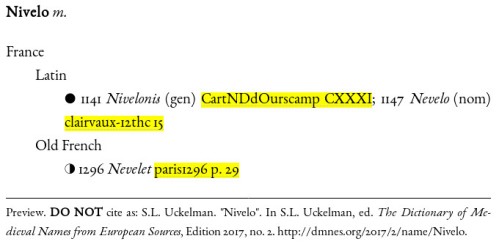Every Monday we will post an entry that hasn’t yet been published with a view towards harnessing the collective onomastic power of the internet. If you have any thoughts about the name’s origin, other variants it might be related to, other examples of its use, etc., please share them in the comments! If you wish to browse other Mystery Monday names, there is an index.
It’s always interesting when a particular mystery name has more than one citation (and they’re not just the same person showing up in a collection of related documents). It’s even more interesting when that mystery name appears in different sources. It’s even more interesting when that mystery name appears in different sources and different centuries — and in both Latin and the vernacular. It’s not often that we have that much disparate evidence for a name (albeit all in France and all within a 150 year period) and have no idea what the origin of the name is. Welcome to today’s Mystery Monday name!
Have you seen this name before? Got any guesses for its origin? (This doesn’t seem relevant). Any further examples? (Apparently there was a Bishop of Soissons by this name in 1205; and another Crusader in the First Crusade). Please share in the comments!


I see no mystery here: The name is obviously identical to the name Nibelung (related to the mythological lineage of the house of Burgundian kings). Francī Nivilōnēs is used in the poem “Waltharius” c. 920 to poetically denote the Burgundians.
That identification has been popular, at least in the earlier literature, and was the first possibility that occurred to me, but there seem to be very few instances of the same person appearing both as Nivelongus (or the like) and as Nivelo. I can’t rule it out, but on balance I prefer the alternative given in my answer.
From a slightly earlier period Morlet I:173a has quite a few examples of Nevelo and Nivelo, together with one each of Nevilo and Nebelo. She also has strong forms Nivalus and Nevolus, the latter twice. She takes this to be from PGmc *niwjaz ‘new’, presumably with the diminutive suffix PGmc *-ilaz. The well-attested OFr Nevelon is an expected reflex of Nevelo: Germanic n-stem names were often adopted in the OFr oblique case (e.g., Hugon).
The only other possibility that comes to mind is a derivation from PGmc. *nebulō ~ *nebulaz ‘mist, fog, darkness’. This, however, seems considerably less plausible semantically. Moreover, Morlet has (among others) the names Nivardus, Niwarius, Nifeldis, Niuurat, and Nivulfus, which can hardly be anything but dithematic names with a prototheme Niv- or the like and familiar deuterothemes from PGmc *-harduz, *-harjaz, *-hildiz, *-rēdaz, and *-wulfaz.
Förstemann (1900) also derives Nibelung from *niwjaz ‘new’ and argues on linguistic grounds against a derivation from *nebulō (the existence of forms with i as their first vowel cannot be explained by assuming that derivation). He relates Nibelung to the modern German word Neuling “newcomer.”
So, *niwjaz ‘new’ is the protheme in both cases, only the details on the ending differ.
Even if Förstemann was right about Nibelung, the question still remains whether Nivelo ~ Nevelo is actually from Nivelung or merely related; I lean towards the latter view.
De Vries, Altnordisches etymologisches Wörterbuch s.v. Niflungar, offers yet another possibility for Nibelung. I quote the relevant part, expanding abbreviations:
If the place-name actually is the source of the personal name, its etymology isn’t really relevant, but I was curious, and Google Books allowed me to see this bit of Ernst Gamillscheg, Romania Germanica. Band 1 Zu den ältesten Berührungen zwischen Römern und Germanen, Die Franken, p. 185: